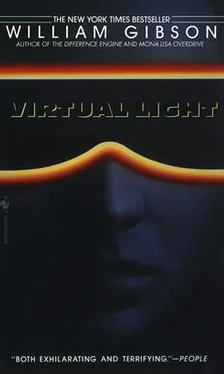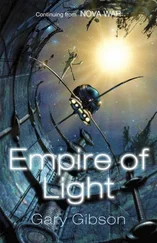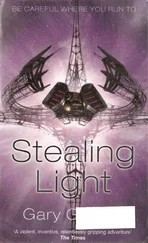“Hey, good buddy” Rydell said, “you gonna call tip ol’ Sublett for us, or what?”
The man went back into the blockhouse.
“What’s that about nails?” RydeE asked.
“Something Skinner told me about once” she said. “Scared me.”
Dora, Sublett’s mother, drank Coke and Mexican vodka. Rydell had seen people drink that before, but never at room temperature. And the Coke was flat, because she bought it and the vodka in these big plastic supermarket bottles, and they looked as though they’d already lasted her a while. Rydell decided he didn’t feel like drinking anyway.
The living room of Dora’s trailer had a matching couch and reclining lounger. Dora lay back in the lounger with her feet up, for her circulation she said, Rydell and Chevette Washington sat side by side on the couch, which was more a loveseat, and Sublett sat on the floor, his knees drawn up almost under his chin. There was a lot of stuff on the walls, and on little ornamental shelves, but it was all very clean. Rydell figured that was because of Sublett’s allergies. There sure was a lot of it, though: plaques and pictures and figurines and things Rydell figured had to be those prayer hankies. There was a flat type of hologram of Rev. Fallon, looking as much like a possum as ever, but a possum that had gotten a tan and maybe had plastic surgery. There was a life-size head of J.D. Shapely that Rydell didn’t like because the eyes seemed to follow you. Most of the good stuff was sort of grouped around the television, which was big and shiny but the old kind from before they started to get real big and flat. It was on now, showing this black and white movie, but the sound was off.
“You’re sure you won’t have a drink, Mr. Rydell?”
“No ma’am, thank you” Rydell said.
“Joel doesn’t drink. He has allergies, YOU know.”
“Yes ma’am.” Rydell hadn’t ever known Sublett’s first name before.
Sublett was wearing brand-new white denim jeans, a white t-shirt, white cotton socks, and disposable white paper hospital slippers.
“He was always a sensitive boy, Mr. Rydell. I remember one time he sucked on the handle of this other boy’s Big Wheel. Well, his mouth like to turned inside-out.”
“Momma” Sublett said, “you know the doctor said you ought to get more sleep than you been getting.”
Mrs. Sublett sighed. “Yes, well, Joel, I know you young people want a chance to talk.” She peered at Chevette Washington. “That’s a shame about your hair, honey. You’re just as pretty as can be, though, and you know it’ll just grow in so nice. I tried to light the broiler on this gas range we had, down in Galveston, that was when Joel was just a baby, he was so sensitive, and that stove about blew up. I just had had this perm, dear and, well…”
Chevette Washington didn’t say anything.
“Momma” Sublett said, “now you know you’ve had your nice drink…”
Rydell watched Sublett lead the old woman off to bed.
“Jesus Christ” Chevette Washington said, “what’s wrong with his eyes?”
“Just light-sensitive” Rydell said.
“It’s spooky, is what it is.”
“He wouldn’t hurt a fly” Rydell said.
Sublett came back, looked at the picture on the tv, then sighed and shut it off. “You know I’m not supposed to leave the trailer, Berry?”
“How’s that?”
“It’s a condition of my apostasy. They say I might corrupt the congregation by contact.” He perched on the edge of the recliner so he wouldn’t have to actually recline in it.
“I thought you’d blown Fallon off when you came out to LA.”
Sublett looked embarrassed. “Well, she’s been sick, Berry, so when I came here I told ’em I was here to reconsider. Meditate on the box ’n’ all.” He wrung his long pale hands. “Then they caught me watching Videodrome. You ever see, uh, Deborah Harry, Rydell?” Sublett sighed and sort of quivered.
“How’d they catch you?”
“They’ve got it set up so they can monitor what you’re watching.”
“How come they’re out here anyway?”
Sublett ran his fingers back through his dry, straw-colored hair. “Hard to say, but I’d figure it’s got something to do with Reverend Fallon’s tax problems. Most of what he does, lately, it’s about that. Didn’t your job in San Francisco work out, Berry?”
“No” Rydell said, “it didn’t.”
“You want to tell me about it?” Rydell said he did.
“I think he shot through something to do with the damned heater, too” Rydell said. They were back in the RV, outside the perimeter.
“I like your friend” she said. “I do too.”
“No, I mean he really cares about what’s going to happen to you. He really does.”
“You take the bed” he said. “I’ll sleep up front.”
“There’s no windshield. You’ll freeze.”
“I’ll be okay.”
“Sleep back here. We did before. It’s okay.”
He woke in the dark and listened to the sound of her breathing, to the creak of stiff old leather from the jacket spread over her shoulder.
Sublett had listened to his story, nodding sometimes, asking a question here and there, his mirrored contacts reflecting tiny convex images of them sitting there on that loveseat. In the end he’d just whistled softly and said, “Berry, it sounds to me like you’re really in trouble now. Bad trouble.”
Really in trouble now.
Rydell slid his hand down, brushing one of hers by accident as he did it, and touched the bulge of his wallet in his back pocket. What money he had was in there, but Wellington Ma’s card was in there, too. Or what was left of it. The last time he’d looked, it had broken into three pieces.
“Big trouble” he said to the dark, and Chevette Washington lifted the edge of her jacket and sort of snuggled in closer, her breathing never changing, so he knew she was still asleep.
He lay there, thinking, and after a while he started to get this idea. About the craziest idea he’d ever had.
“That boyfriend of yours” he said to her, in the tiny kitchen of Sublett’s mother’s trailer, “that Lowell?”
“What about him?”
“Got a number we could reach him at?”
She poured milk on her cornflakes. It was the kind you mixed up from powder. Had that thin chalky look. The only kind Sublett’s mother had. Sublett was allergic to milk. “Why?”
“I think maybe I want to talk to him about something.”
“About what?”
“Something I think maybe he could help me with.”
“Lowell? Lowell’s not gonna help you. Lowell doesn’t give a rat’s ass for anybody.”
“Well” Rydell said, “why don’t you just let me talk to him.”
“If you tell him where we are, or he has it traced back through the cd-net, he’ll turn us in. Or he would if he knew anybody was after us.”
“Why?”
“He’s just like that.” But then she gave Rydell the phone and the numher.
“Hey, Lowell?”
“Who the fuck is this?”
“How you doin’?”
“Who gave you—”
“Don’t hang up.”
“Listen, motherf—”
“SFPD Homicide.”
He could hear Lowell draw on a cigarette. “what did you say?” Lowell said.
“Orlovsky. SFPD Homicide, Lowell. That big fucker with the great big fucking gun? Came in the bar there? You remember. Just before the lights went out. I was over there by the bar, talking with Eddie the Shit.”
Lowell took another drag, shallower by the sound of it. “Look, I don’t know what you—”
“You don’t have to. You can just hang up right now, Lowell. But if you do, boy, you just better kiss your ass goodbye. Because you saw Orlovsky come in there for the girl, Lowell, didn’t you? You saw him. He didn’t want you to. He wasn’t in there on any SFPD business, Lowell. He was there on his own stick. And that’s one serious bad oficer, Lowell. Serious as cancer.”
Читать дальше











